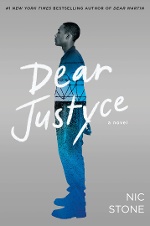Publishers' Preview: Fall 2020: Five Questions for Nic Stone
Addressed to the hero of Stone’s first novel Dear Martin, Dear Justyce follows the troubled fortunes of Justyce’s friend Quan.

This interview originally appeared in the September/October 2020 Horn Book Magazine as part of the Publishers’ Previews: Fall 2020, an advertising supplement that allows participating publishers a chance to each highlight a book from its current list. They choose the books; we ask the questions.
Sponsored by

Addressed to the hero of Stone’s first novel Dear Martin, Dear Justyce follows the troubled fortunes of Justyce’s friend Quan.
 1. Do you have a favorite secondary character among your favorite books, who you wish had a book of their own?
1. Do you have a favorite secondary character among your favorite books, who you wish had a book of their own?
Easy: Lord Henry Wotton from The Picture of Dorian Gray. His perspective on morality (“We are not put into the world to air our moral prejudices”) has been a compass for me in my own writing, but I would love to see a book where he actually walks in his philosophies and witnesses how difficult they are to uphold.
2. What’s the difference between Nic Stone when she wrote Dear Martin and when she wrote Dear Justyce?
Dear Justyce Nic Stone is less terrified, less moved by adult opinions of her books for teens (#sorrynotsorry), and more aware of the importance of said teens seeing authentic portrayals of themselves as their identities are still forming. Also, more gray hairs.
3. Like Justyce, I almost laughed when Quan’s lawyer pulled out a legal pad. Are you a fan of courtroom dramas?
 One word: Matlock. I used to curl up on my Granny A’s bed and watch with her. Also love a great courtroom drama book. I live for the courtroom scenes in Jodi Picoult’s books, and she actually helped me with the court scene in Dear Martin.
One word: Matlock. I used to curl up on my Granny A’s bed and watch with her. Also love a great courtroom drama book. I live for the courtroom scenes in Jodi Picoult’s books, and she actually helped me with the court scene in Dear Martin.
4. Quan has Justyce; who is your advocate?
Super #blessed to have a few: my epic editor Phoebe Yeh, agent Mollie Glick, and mentors Jodi Picoult and John Nee. And my dad. Who is fully convinced the solar system is a result of something I wrote. Love that guy.
5. How can librarians and teachers help, as Quan’s mentor Doc says, change the rhetoric to change the trajectory?
It starts with acknowledging the problematic stuff and why it’s harmful. I had a chat recently with someone about the interchangeability of boy and man to serve the means of the speaker when referring to a Black male. Boy, historically, has been used to belittle and demean. Man is used to adultify actual Black boys and justify the harshness aimed at them that isn’t aimed at their white counterparts. Lots of work ahead but all worthwhile!
Sponsored by

Photo: Nigel Livingstone.
RELATED
ALREADY A SUBSCRIBER? LOG IN
We are currently offering this content for free. Sign up now to activate your personal profile, where you can save articles for future viewing.







Add Comment :-
Be the first reader to comment.
Comment Policy:
Comment should not be empty !!!